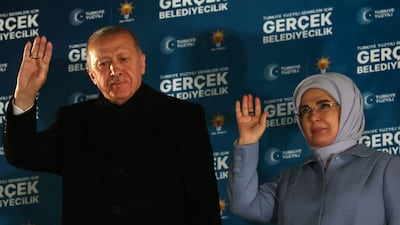Opposition mayors in Istanbul and Ankara claimed victory in Turkey's local elections on Sunday, delivering a surprise election defeat to President Recep Tayyip Erdogan.
He later accepted their gains, calling the vote a “turning point”, as his ruling Justice and Development Party (AKP) lost in key battlegrounds Ankara and Istanbul.
With 96 per cent of ballot boxes opened, Istanbul's Republican People's Party (CHP) mayor Ekrem Imamoglu said he had seen off the challenge of Mr Erdogan's candidate by more than one million votes.
“We have won the election,” Mr Imamoglu declared. “Tomorrow is a new spring day for our country.”
Large crowds filled the square outside the Istanbul city headquarters waving Turkish flags and lighting torches to celebrate the result.
The CHP also retained the capital with Mayor Mansur Yavas saying “the elections are over, we will continue to serve Ankara”.
Mr Yavas was leading with 58.6 per cent of the vote against 33.5 per cent for his AKP opponent from 46.4 per cent of ballot boxes opened. The CHP was also ahead in Izmir, Turkey's third city and a party stronghold.
Both Mr Imamoglu and Mr Yavas are members of the pro-secular nationalist Republican People's Party or CHP. Mr Erdogan's AKP lost control of both cities in a surprise victory for the country’s embattled opposition in 2019, which ushered in fresh crackdowns on his opponents, and was followed by Mr Erdogan's re-election as president in 2023.
Sixty-one million people were eligible to vote in the local elections across the country.
The vote was taking place after years of economic gloom, with the country having suffered 70 per cent inflation and a fall in industrial output. But in recent months, the economy has returned to modest growth and youth unemployment dipped around a percentage point to nine per cent last year, significantly below a lot of European countries, but still near double digits.
There were reports of violence in separate incidents across the country, despite the Interior Minister Ali Yerlikaya earlier announcing that 594,000 security personnel had been posted to ensure the vote goes smoothly.
The state-owned Anadolu reported that armed groups clashed in south-eastern Turkey, with at least one person killed and 11 more injured. It added that another 16 were injured in a clash in Sanliurfa, also in Turkey's restive south-east, where Kurdish separatist groups have a strong presence.
The election was seen as crucial for Mr Erdogan's plans to usher in a new national constitution that would allow him to rule beyond 2028, analysts say.
Observers say many governing party supporters could have chosen not to go to the polls in protest of the economic downturn that has left many struggling to pay for food, utilities and rent.
Mr Imamoglu ran in the poll without the support of some of the parties that helped him to victory in 2019.
Both the pro-Kurdish Peoples’ Equality and Democracy Party and the nationalist IYI Party fielded their own candidates in the race, which risked siphoning away votes from Mr Imamoglu.
A six-party opposition alliance led by CHP disintegrated after it failed to oust Mr Erdogan in last year's election, unable to capitalise on the economic crisis and the government's initially poor response to last year's devastating earthquake that killed more than 53,000 people.
Meanwhile, a new religious-conservative party, the New Welfare Party, or YRP, was appealing to voters who have been disillusioned with Mr Erdogan’s handling of the economy and was expected to draw some votes away from his candidates.
In Turkey's mainly Kurdish-populated south-east, the DEM Party was expected to win many of the municipalities but it's unclear whether it would be allowed to retain them. In previous years, Mr Erdogan’s government removed elected pro-Kurdish mayors from office for alleged links to Kurdish militants and replaced them with state-appointed trustees.
Agencies contributed to this report










